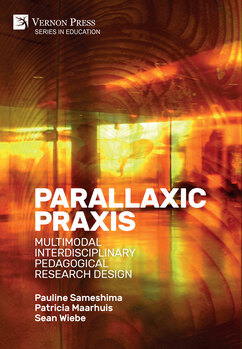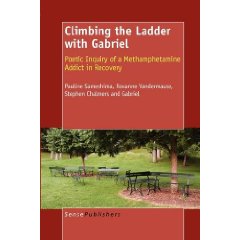|
Parallaxis Praxis: Multimodal Interdisciplinary Pedagogical Research Design
by Pauline Sameshima, Patricia Maarhuis and Sean Wiebe Winner of the '2020 Society of Professors of Education Outstanding Book Award' Link to publisher. Parallaxic Praxis is a research framework utilized by interdisciplinary teams to collect, interpret, transmediate, analyze, and mobilize data generatively. The methodology leverages the researchers’ personal strengths and the collective expertise of the team including the participants and community when possible. Benefits include the use of multi-perspective analyses, multi-modal investigations, informal and directed dialogic conversations, innovative knowledge creation, and models of residual and reparative research. Relying on difference, dialogue, and creativity propulsion processes; and drawing on post-qualitative, new materiality, multiliteracies, and combinatorial, even juxtaposing theoretical frames; this model offers extensive research possibilities across disciplines and content areas to mobilize knowledge to broad audiences. This book explains methods, theories, and perspectives, and provides examples for developing creative research design in order to innovate new understandings. This model is especially useful for interdisciplinary partnerships or cross-sector collaborations. This book specifically addresses issues of research design, methodology, knowledge generation, knowledge mobilization, and dissemination for academics, students, and community partners. Examples include possibilities for scholars interested in doing projects in social justice, community engagement, teacher education, Indigenous research, and health and wellness. |
Praise
'Parallaxic Praxis' offers an overview of an innovative framework for research design. Its focus on interdisciplinarity, multi-modalities, arts integration, cross-sector partnerships, community engagement, and knowledge mobilization is exactly what is needed to tackle complex 21st century problems.
Diane Conrad, PhD
Professor Drama/Theatre Education
University of Alberta, Canada
Based on a research model grounded in imagination as method, this bold and important book, dramatically and clearly moves a new tradition of post-qualitative research forward. Fully grounded theoretically, this book presents the reader with several highly developed examples of the parallaxic praxis model within different disciplinary traditions. It is a must have for all researchers wanting to reclaim humanity from a dehumanizing-technocratic reality.
Ralph Raunft, PhD,
Professor of Art (Emeritus), College of Creative Arts
Miami University
Once again I am transformed by the work of Pauline Sameshima, Patricia Maarhuis, and Sean Wiebe. In their latest book, Parallaxic Praxis: Multimodal Research Design they present a model of inquiry that is relational, contingent, artistic, and generative. For those of us working in dialogic and relational research, I consider this accessible and profound book a must read.
Richard Sawyer, PhD
Professor of Education, College of Education
Washington State University
The authors open a lyrical, transcendent, and deeply credible research framework complete with its own lexicon, modalities, and practical conventions. Prepare to re-think everything.
Eric Hamilton, PhD
Professor of Education, Pepperdine University
Sr. Program Manager, International Bureau of Education, UNESCO
'Parallaxic Praxis' offers an overview of an innovative framework for research design. Its focus on interdisciplinarity, multi-modalities, arts integration, cross-sector partnerships, community engagement, and knowledge mobilization is exactly what is needed to tackle complex 21st century problems.
Diane Conrad, PhD
Professor Drama/Theatre Education
University of Alberta, Canada
Based on a research model grounded in imagination as method, this bold and important book, dramatically and clearly moves a new tradition of post-qualitative research forward. Fully grounded theoretically, this book presents the reader with several highly developed examples of the parallaxic praxis model within different disciplinary traditions. It is a must have for all researchers wanting to reclaim humanity from a dehumanizing-technocratic reality.
Ralph Raunft, PhD,
Professor of Art (Emeritus), College of Creative Arts
Miami University
Once again I am transformed by the work of Pauline Sameshima, Patricia Maarhuis, and Sean Wiebe. In their latest book, Parallaxic Praxis: Multimodal Research Design they present a model of inquiry that is relational, contingent, artistic, and generative. For those of us working in dialogic and relational research, I consider this accessible and profound book a must read.
Richard Sawyer, PhD
Professor of Education, College of Education
Washington State University
The authors open a lyrical, transcendent, and deeply credible research framework complete with its own lexicon, modalities, and practical conventions. Prepare to re-think everything.
Eric Hamilton, PhD
Professor of Education, Pepperdine University
Sr. Program Manager, International Bureau of Education, UNESCO
|
Climbing the Ladder with Gabriel: Poetic Inquiry of a Methamphetamine Addict in Recovery by Pauline Sameshima, Roxanne Vandermause, Stephen Chalmers and Gabriel Climbing the Ladder with Gabriel demonstrates the power of photography and poetry to render the experience of methamphetamine addiction and recovery through the art of an interdisciplinary research methodology. Instructors, students, recovering addicts, and prevention/recovery advocates will find this a valuable resource. |
Reviews
There are many ways to "know the world". The authors of this remarkable text have adopted an eclectic mix of methodologies from the arts and sciences to portray the experience of methamphetamine addiction. While it may never be possible to fully "know" another's experience, this book provides readers with one of the most intimate portraits of a methamphetamine addict ever assembled. The reader will be touched by the juxtaposition of everyday joy and the hopelessness and regret so poignantly portrayed by these authors. The book is also hopeful, documenting that, even in the throes of terrible addiction, unique humanness survives and recovery is always possible. - John M. Roll, Professor and Associate Dean, College of Nursing. Director, Program of Excellence in the Addictions, Washington State University
The authors of this remarkable work have opened the door for new ways of compiling and revealing what it means to be a human being caught in the dangerously perplexing problem of drug addiction and its fallout in a wide circle of social problems. By summoning up both a rigorous philosophy and procedural logic as a baseline and an artfulness that gives the bare bones of hard data a very human face, a heartbeat, and a voice that everyone can hear, they make a compelling case for such work in arts-based research and for pluralism in social science research design and methods. This is art caught in a handshake with science that matters. – Ivan Brady, Distinguished Teaching Professor Emeritus, Anthropology, State University of New York, Oswego.
What a fantastic idea! What a great accomplishment! - Laurel Richardson, Professor Emeritus of Sociology and international leader in qualitative research, The Ohio State University.
This poetic inquiry performs a vibrant testimony to the possibilities of personal and political transformation that can emerge in research that is heartful and artful. When we collaborate creatively and lovingly, we can find the ways of bountiful hope for living together with health. - Carl Leggo, Professor and Poet, Language and Literacy, University of British Columbia, Canada.


